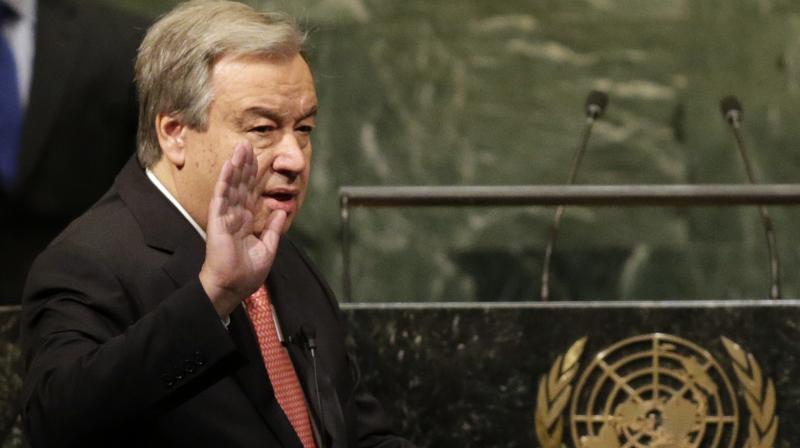Former Portuguese PM Antonio Guterres sworn in as UN secretary-general
Antonio Guterres takes over from Ban Ki-moon on January 1.

UNITED NATIONS: Former Portuguese Prime Minister Antonio Guterres was sworn in Monday as secretary-general of the United Nations, becoming the ninth U.N. chief in the body's 71-year history.
The former U.N. refugee chief was elected to the top job by acclamation in the General Assembly in October. He takes over from Ban Ki-moon on Jan. 1.
Guterres, 67, performed well in answering questions before assembly members and his executive experience as prime minister and as the U.N. High Commissioner for Refugees in 2005-2015 propelled him to first place among 13 candidates vying for the job in informal polls in the Security Council. After the sixth poll, the council nominated him by acclamation and his name was sent to the assembly for final approval.
After being sworn in by General Assembly President Peter Thomson, Guterres addressed the 193 member nations, saying the U.N. must work to simplify, decentralize and make more flexible its sprawling bureaucracy.
"It benefits no one if it takes nine months to deploy a staff member to the field," he said. "The United Nations needs to be nimble, efficient and effective. It must focus more on delivery and less on process, more on people and less on bureaucracy."
Guterres also said he would send a clear signal that gender parity "from top to bottom" within the organization would be among his first priorities. The swearing-in came after the General Assembly paid tribute to Ban, ending with a standing ovation for the South Korean. Guterres' swearing-in ceremony included the U.N.'s top leaders and was attended by dignitaries.
U.S. Ambassador Samantha Power lauded Ban's accomplishments while in office and said she was confident Guterres is the right person to replace him. "He is the man for the job in such challenging times," she said.
Louis Charbonneau, the U.N. director at Human Rights Watch, said rights abuses are abundant around the globe, not just in war zones like Syria. He said Guterres should use his position and authority to "call out rights abuses wherever they occur."
The selection of a new secretary-general had traditionally been decided behind closed doors by a few powerful countries. But this year, the process involved public discussions with each candidate who was campaigning for the job.
U.N. chiefs are charged with promoting sustainable development, working for peace around the globe, protecting human rights and dealing with humanitarian catastrophes. Ban served two 5-year terms.

